| Submitted by: LUFHISSA ((GERENCIA PLANTA)) (gerenciaplanta@lufhissa.com) [7 Oct 04] |
|---|
Storm in Aquarius.
I'm sending you a picture taken last weekend. Some times a storm is bad for astronomy but if You have your camera is a good time for a great picture.
Greetings from Monterrey Mexico!!!
|
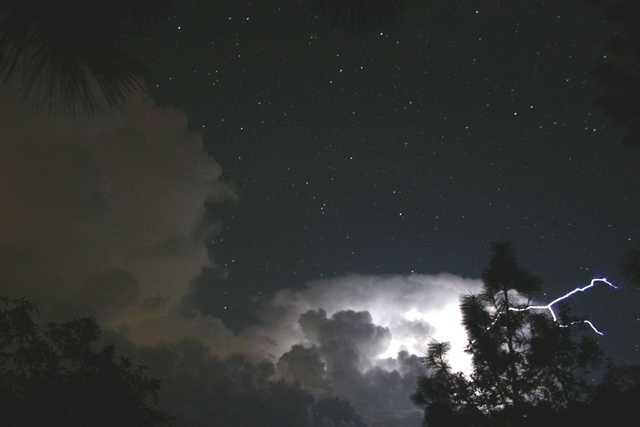
|
| Submitted by: submitter [24 Aug 04] |
|---|
|
All where taken with a Canon 10D riding piggyback on my ETX-125.
|
 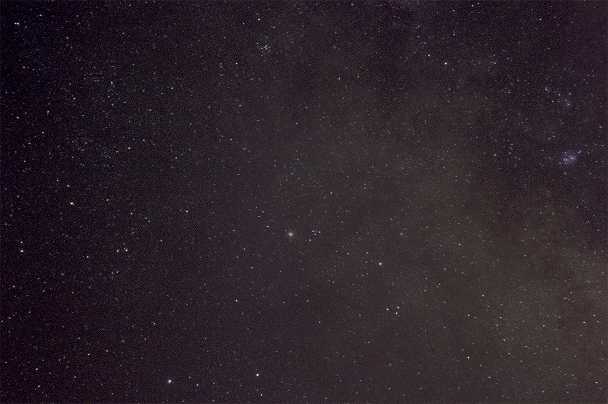
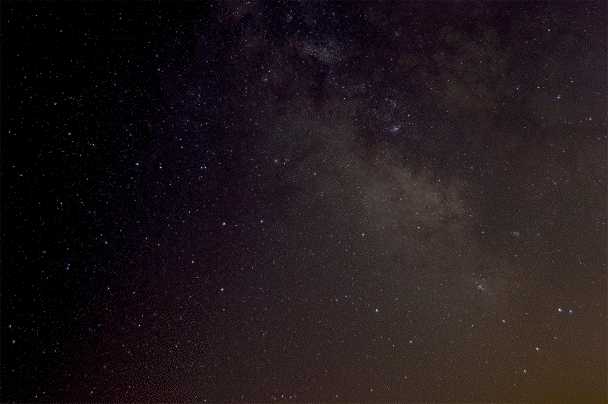
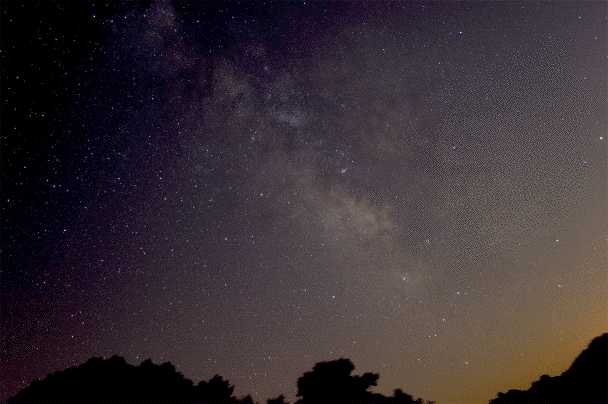
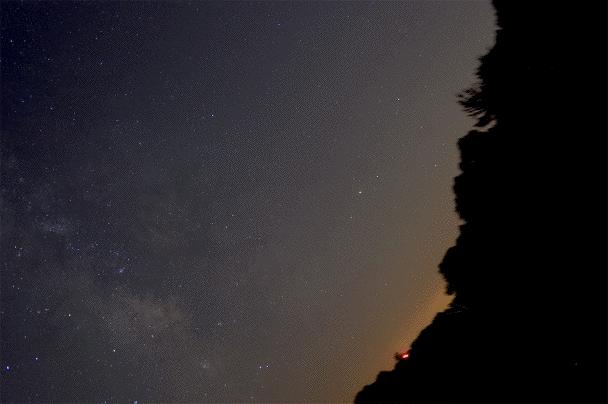
|
| Submitted by: kevin keyes (fishonkevin@sbcglobal.net) [20 Aug 04] |
|---|
|
It has been a while since I've contacted you. But I would like to share a some time overlooked, easily photographed celestial object, Iridium Flares. These satallites, their orbits and the exact time of the flare are calculated by www.heavens-above.com for your specific location.
All you need to observe them is your naked eye and a compass ( to find the direction). Even in heavily light polluted cities they are visible.
For photographing, a camera with a bulb mode or are able to take a 1min. exposure, mounted static on a tripod or piggybacked, are my prefered methods. I use a Digital Rebel w/stock 18-55mm lens, and cable release. I think a video camera would also work, but haven't tried it.
The two examples were shot with no particular ISO setting. Iridium 36 was taken static and the twin Iridium 96 and 55 with M-13(tracked) was piggy-backed. As you can see by the orange/brown background light pollution(Grrr) is a real problem, but the flares were easily seen naked eye. |
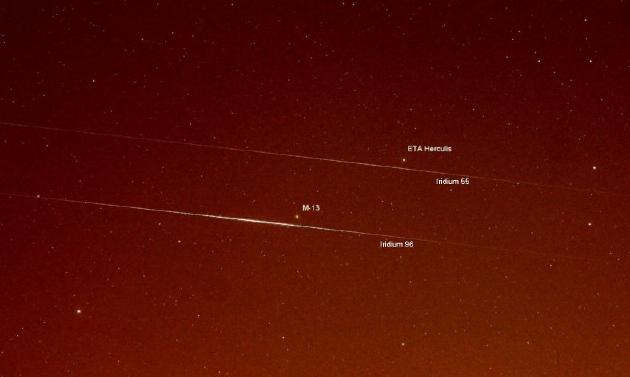 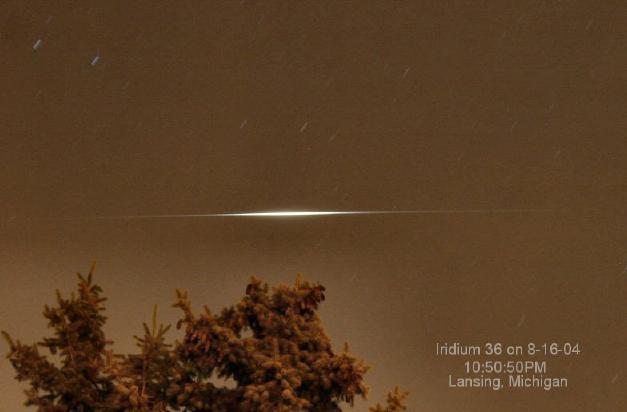
|
| Submitted by: Ignacio Rodriguez (igrodroch@axtel.net) [12 Aug 04] |
|---|
|
I visited Grand Canyon in Arizona last month. I did not take my ETX-125 with me but I had the chance to take some tripod photographs.
The photographs were taken with my Olumpus OM-1n, a Zuiko 50mm f/1.4 lens and Konica Centuria 1600 film. It ia a good options for short exposure photos. The milky way photo exposure was just 45 seconds with the lens closed to f/2.8. This best esposure to avoid star trails is 15 seconds but I wanted to record the milky way as much as posible.
The other photo is a 15 minutes exposure at f/4. You can identify Polaris at the center. This film show much more stars that te ones visible to the naked eye.
|
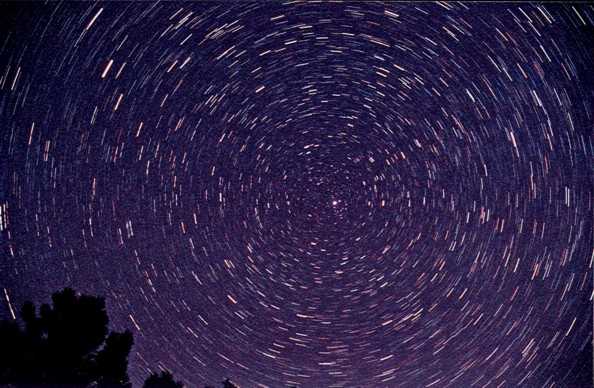 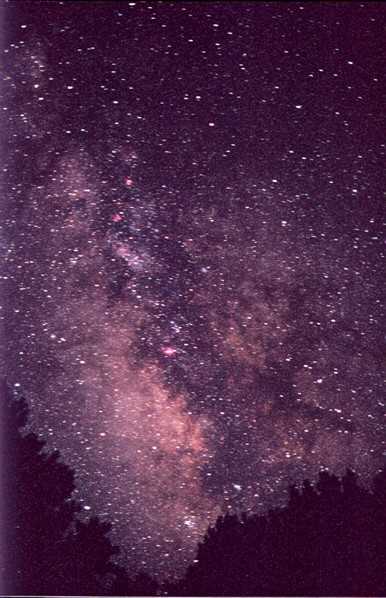
|
| Submitted by: geheniau@xs4all.nl (geheniau@xs4all.nl) [12 Aug 04] |
|---|
|
Photos form vacation are back....
Piggy back is possible.
Very hard because camera is very heay and ETX90 was point up, so no
counterweight possible...tricky thing, almost ruined my ETX.
But still proud on this one.
|
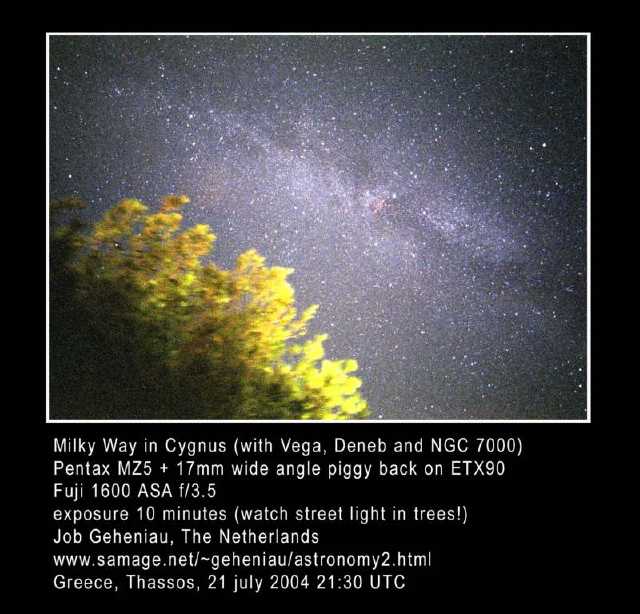
|
Did with the starclub some perseid watching. We counted 40 in 2 hours. My
digital camera broke, so I had to use my consumer Sony digital video
camera. Managed to get some frames with Perseids from it. (It was in Night
shot (IR) mode, so a lot of noise...but....)
Job Geheniau
The Netherlands
|
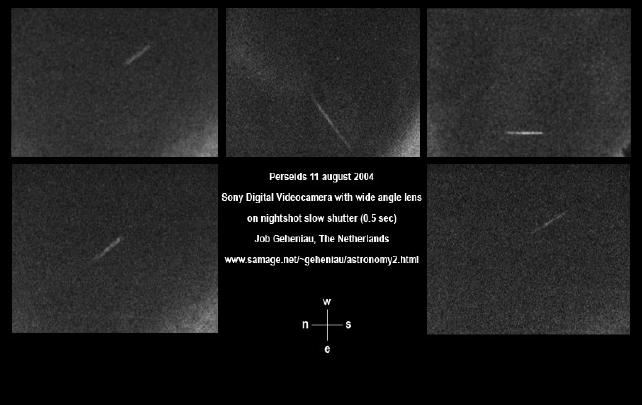
|
| mark mathosian (mmathosian@comcast.net) [24 Jun 04] |
|---|
|
Here is one of my favorite sky shots for your website. Thought your viewers might like it.
|
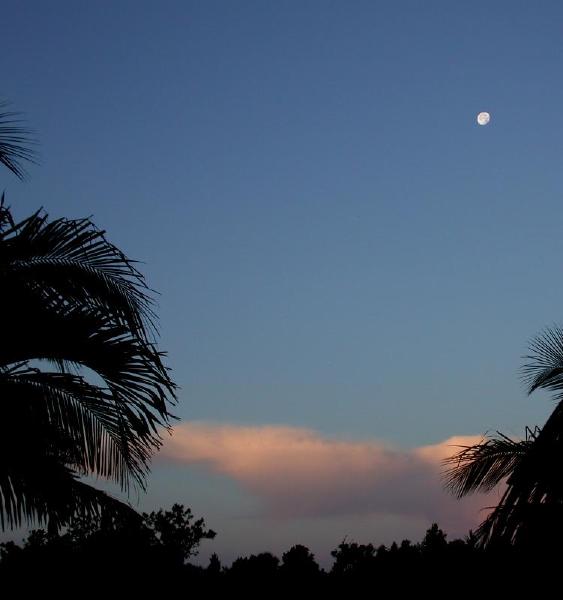
|
| leutloffa@juno.com [30 Apr 04] |
|---|
|
here is a posting (if you like) to "Sky". Just returned from a company sponsored trip to the Big Island...and took an Astronomy Tour up the nearly 14,000 foot high Mauna Kea at sunset...then returned to the visitors center at 9,000 feet for the BEST night sky viewing ever. (Dark Clear Skies and a thin Cresent Moon). It was an amazing experience...even got a chance to view out of the 19" scope at the visitors center. Alan
|

Click image for full-size image (312KB)
|
| "Dave Wallace" (d_wallace@ecrm.com) [30 Apr 04] |
|---|
This mosaic is a horizon-to-horizon panorama along the ecliptic showing
nearly all the naked-eye objects of the solar system (only the sun and
the planet Uranus are missing). This was shot with a Canon Digital
Rebel 300D using a 50mm lens (70mm effective focal length). Each
exposure was 1 second at f/2, with the camera set to ISO 400. Sky
conditions were only fair -- atmospheric transparency was not too good
and Mercury didn't pop out of the sky glow until nearly 45 minutes after
sunset.
The camera was mounted on a home-built platform controlled by a 497
Autostar. The center of each frame was offset one hour of RA from the
previous. Stitched in Photoshop and down-sampled, but still a very
large file.
|

Click image for full-size image (672KB)
|
| "Rick" (stankiewiczr@nexicom.net) [25 Apr 04] |
|---|
|
On the evening (7:00 p.m.) of April 23, 2004, I took some daylight images of the crescent moon and Venus from my backyard. This was about 1 1/4 hours before the sun was even going to set. The attached image is a nice one showing their relative brightness to each other. It is also more distinct than most images that I have seen posted on the web recently of the same sort of thing. I hope you like it.
This shot was taken with a Nikon Coolpix 995 camera, near Keene Ontario.
|
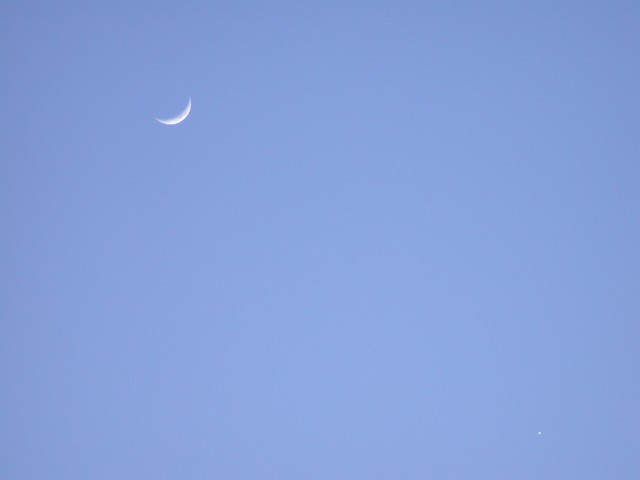
|
| geheniau@xs4all.nl [22 Apr 04] |
|---|
|
a nice sun reflection I saw this evening.
|
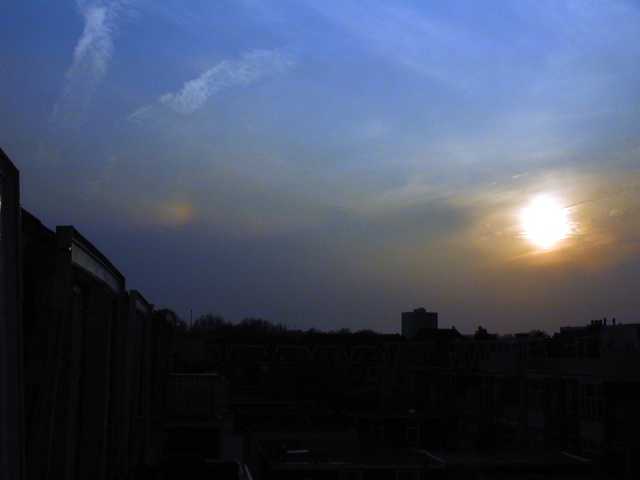
|
| "Rick" (stankiewiczr@nexicom.net) [22 Apr 04] |
|---|
|
There is a few images from the March 22, 2004 planetary alignment. I captured just the crescent moon (earthshine) and Mercury and Venus, the crescent moon and Mercury in the other. The third image is a beautiful moonset on April 6, 2004.All images were taken with a NikonCoolpix 995. They were all from my backyard near Keene (south of Peterborough), Ontario. |
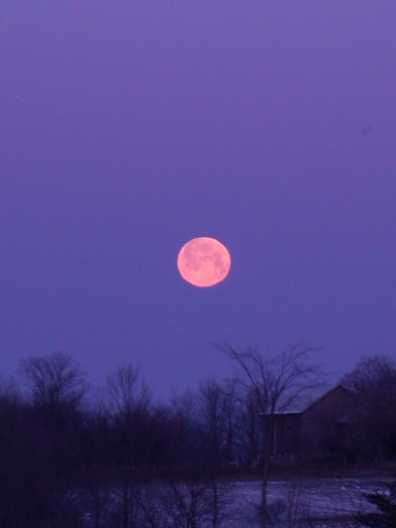 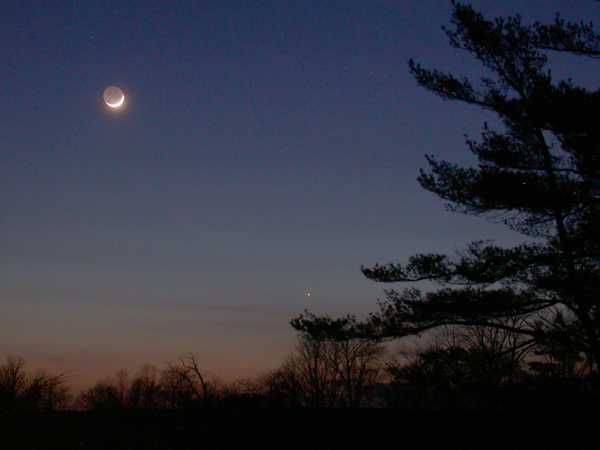 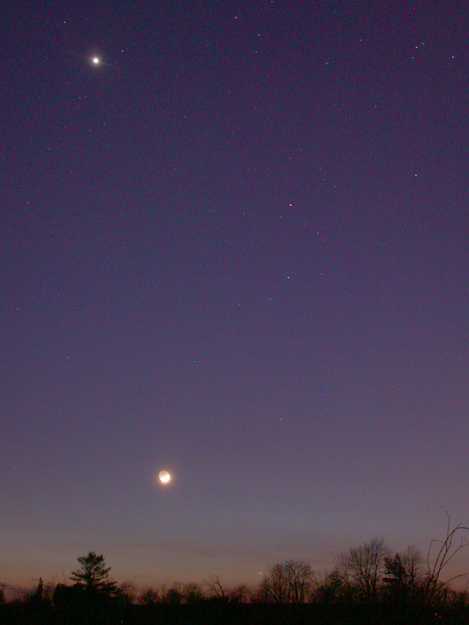
|
| Mark (medell@wavecable.com) [18 Apr 04] |
|---|
|
Here is a picture of Venus I took from my deck on 04-16-2004, makes a great wallpaper!
|
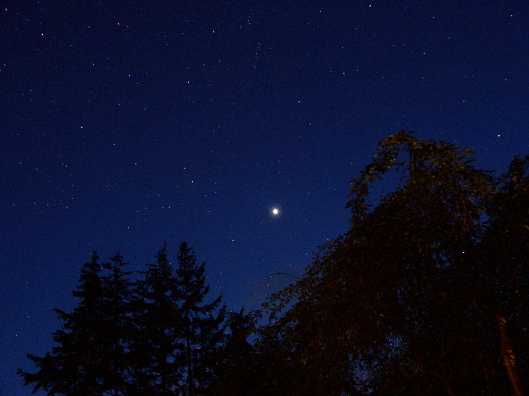
Click image for full-size image (388KB)
|